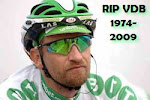Wishful thinking, I know, since there is potentially such an up-side to doping for the elite rider who gets away with it and earns millions as a result. It's tough to argue against that economic logic, though it's in no way a morally or ethically-justifiable approach. (Stay tuned to this site for a link to an upcoming interview where we discuss the economic incentive to dope in greater detail.)
 Given that doping has been with the sport since its earliest days, and in light of how severely skewed the incentives:disincentives ratio to doping is, what's the answer?
Given that doping has been with the sport since its earliest days, and in light of how severely skewed the incentives:disincentives ratio to doping is, what's the answer? I don't think that legalizing doping is the way forward (sorry Torri). Tacit acceptance of doping isn't going to work anymore, either - that cat's out of the bag and no one is going to be able to put it back in, no matter what we'd like. We just can't go back to pretending that doping isn't a problem. Likewise, the intimidation of still-active athletes who speak-out against doping (ex. Armstrong vs. Simeoni [2] or Armstrong vs. Bassons) has to stop, along with the vilification of those who, either voluntarily, or when confronted with evidence of their guilt, admit their transgressions and indict others, even after the fact. Is increasing the involvement of the State's criminal policing apparatus a potential solution? Aggressively arresting and putting dopers and people who really effed-up like me, people who both doped and helped others to dope, in jail as a deterrent? Then you get the response that government shouldn't be wasting money policing a bunch of careless athletes who want to risk their health to pedal a bike faster. Throw-out the UCI? But then what?
 There isn't an easy answer to this. In fact, there isn't even consensus as to what a fiendishly-complicated answer might look like.
There isn't an easy answer to this. In fact, there isn't even consensus as to what a fiendishly-complicated answer might look like. Ruminating on what Torri said, just for a second - if you legalize doping, you take away every last bit of hope that youngsters might otherwise have when considering whether or not to start cycling. If you know from the beginning that you have to risk your health in order to reach the highest level in your sport, or perhaps just to be an amateur you'd need to dope, what kind of incentive is that to begin cycling?
Unfortunately, the doping products work. EPO really, really works. I can't deny that, like Allen Lim so disingenuously did, implying that a clean athlete could achieve the same performance level as an equal-but-doped competitor. It's even true that, as a result of taking EPO, by the standard of measure I relied upon at the time, my life was great in 2005-6. But the fall-out has been equally spectacular and my life has been destroyed thanks to my involvement in doping. Perhaps the long-term non-health risks are less for someone who earns millions thanks to doping while racing, and can then fund the rest of their life - and their legal defense - when the inevitable catches up with them. But only a select few reap the massive financial benefits accessible as a result of doping, which wouldn't be so concentrated, perhaps, if the playing field were truly more level.
I would implore any athlete considering whether or not to dope to realize that, no matter how effectively they think they'll manage the risk, there are catastrophic possibilities that they can't account for, which will destroy the value of their ill-gotten gains swiftly, and totally.







No comments:
Post a Comment
Pappillon welcomes your comments and encourages your participation. Comments may, however, be moderated.